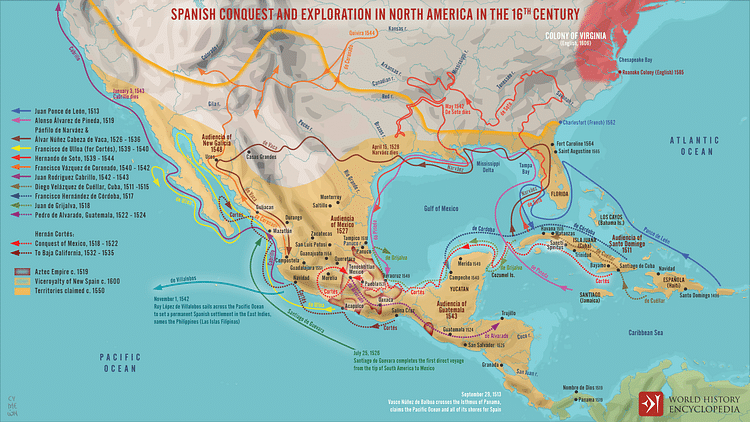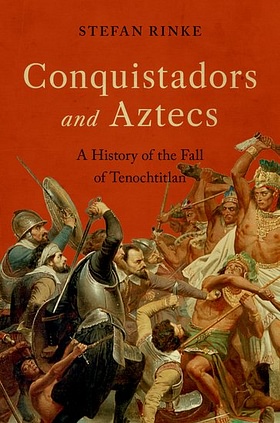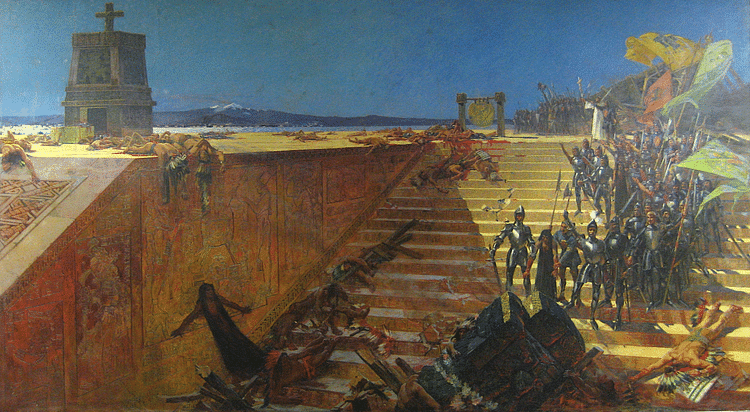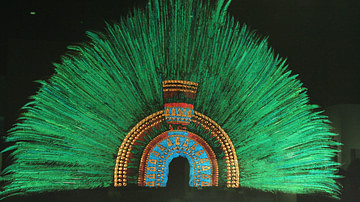The fall in 1519 of Tenochtitlan, the capital of the Mexica or Aztec Empire, as it was later called, laid the foundation for the Spanish colonial empire on the North American mainland. It was the first time that Europeans had subjugated a highly organized state outside the world they had hitherto known. In the process, they created the basis for the first global colonial empires.

Fall of the Aztecs
In the course of the 15th century, the Aztecs had created an empire of conquest demanding tribute from subjugated city-states. These tributes were pressing, and the spirit of discontent was widespread, especially in the recently invaded territories at the margins of the empire. When in 1519 a group of Spanish conquistadors under Hernán Cortés arrived from Cuba, the situation changed. Indigenous communities such as the Totonacs and the Tlaxcaltecans decided to support the foreigners who wanted to reach the Aztec capital Tenochtitlan.
When the allies after much fighting reached there, their leader Cortés was festively welcomed by the Aztec emperor Montezuma II who decided to let the troops enter the city. The long visit turned violent when in May 1520 Pedro de Alvarado, one of Cortés' officers massacred Aztec elites during the Toxcatl festival. What followed was the nocturnal evacuation of the allies who had been besieged in their camp within the city by the Aztecs in the so-called 'Noche triste' on June 30. After their retreat, the decimated allies regrouped in Tlaxcala and started a massive campaign against Tenochtitlan which resulted in the fall of the city in August 1521.
Renaissance European Views
The victory led Spanish chroniclers and historians to regard their country as the legitimate successor to the Roman Empire, which they claimed Spain would even surpass. This resulted in the fundamental assumption of the superiority of Christian Europeans and the inferiority of other ethnic groups, which was characterized as a quasi-natural order of things.
These aspects remained in the foreground in European historiography for centuries, though the original triumphalist attitude would reverse course in the 20th century. The events of that era were celebrated hundreds of times over in popular stories, novels, poems, songs, and operas, and scrutinized in scholarly papers. The academic literature alone fills libraries. The conquest of Tenochtitlan between 1519 and 1521 was certainly an unprecedented event. The urban center was probably one of the largest cities in the world and the capital of a sprawling and, for Europeans, totally alien empire. On the other hand, it was a devastating blow for the losers, the Mexica, who had been expanding their rule in Mesoamerica for decades.
For Renaissance Europeans, who prized first-hand testimony and personal experience and no longer exclusively relied on classical authorities, information from the New World had garnered great interest since 1492. The sensation of the Columbus voyage had already faded by 1519, by which point the Genoese had been dead for over a decade. But in Mexico, new discoveries emerged – things that had never been heard of before in Europe. Even the Bible was unaware of these lands.
At first, the news mainly spread through Hernán Cortés' letters. The leader of the Spanish conquistadors described with wonder all the things that were new and strange to him. His depictions of the rituals, art, cuisine, and jewelry of the Mexica captured the public imagination. Significantly, he put the social hierarchy of Mexican society on par with that of the Spanish by alluding to important Mexica as senores, vasallos, and senorios. The Latin translation of his reports even uses the capitalized term "Don" for the ruler of the Mexica, Moctezuma II Xocoyotzin (aka Montezuma).
Cortés' emphasis on the discipline and remarkable social order in Mexican society starkly contrasts with the earlier experiences of Christopher Columbus. His first report of 1519 gave the impression that negotiations with a foreign ruler were carried out on an equal footing, just as the Catholic monarchs of Spain had expected when they sent Columbus on his journey in 1492. But Columbus had failed to discover any states or powerful kings in the Caribbean. What Cortés described was much closer to the original vision, and Charles V, Holy Roman Emperor, therefore instructed him to treat the new subjects as well as he would vassals in Europe.
Impact on Mesoamerica
For the people of Mesoamerica, the impact of the encounter was no less novel or surprising. The sight of the Spaniards opened up a new world for them, too. Everything was strange to them, from their light skin, occasionally fair hair, and body hair to their clothes and hats, tools, and food and drink. They were particularly struck by the design of their ships and their animals, as horses and dogs were unheard of in Mesoamerica. They were also curious about the armaments, flags, and Christian symbolism, especially the ever-present cross. They depicted these novelties in their historical records in the form of glyphs, a pictorial language that was the counterpart of the written language of the Spanish.
The parties met each other with astonishment, but at eye level, even if both sides felt superior to the other. Indeed, until the end of the 18th century, the global dominance of the Europeans was hardly a given. At this time, around 80% of the world's gross national product was still being generated in Asia; Europeans had extensive colonial possessions only in America, and elsewhere they had established only trading stations. Furthermore, in the early modern period, imperial expansion was not exceptional. In this era, the Ottoman, Chinese, Russian, and Songhay empires in West Africa greatly expanded their dominions, as did the Inca and Mexica empires until the arrival of the Europeans. But these were land empires, whereas the Europeans were opening up utterly new horizons far away from home, across the ocean. The new insights and the knowledge they brought back with them figured prominently in the Renaissance conceptions of the world, which were imbued with humanistic ideals.
Conclusion
The contact between cultures did not take place in a spirit of harmony but under the banner of warlike conquest. In self-portraits, the conquistadors stressed the fact that, like the heroes of the medieval chivalric novels that were very popular at the time, they had defeated a large empire with just a negligible force. This is the myth that has been passed down from generation to generation in modern schoolbooks and went virtually unquestioned for centuries. Recent scholarship, however, drawing more and more on indigenous sources has begun to provide a more complicated portrait of the conquest.
In March 2019, the newly elected President of Mexico, Andres Manuel López Obrador, attracted global interest for letters sent to the Spanish king and the pope. In them, he entreated the recipients to apologize to the indigenous peoples of Mexico for the atrocities committed during the conquest of Mexico 500 years earlier. The letters' contents spread like wildfire across social media and sparked outrage in Spain. The crown swiftly rebuffed him, pointing out that the events of that time could not be judged by today's standards. It also maintained that the Spanish and Mexican people had always known how to "interpret our common past without anger and with a constructive attitude." Although the controversy over the conquest is many centuries old, it is still very much alive, and not just in the Spanish-speaking world.










